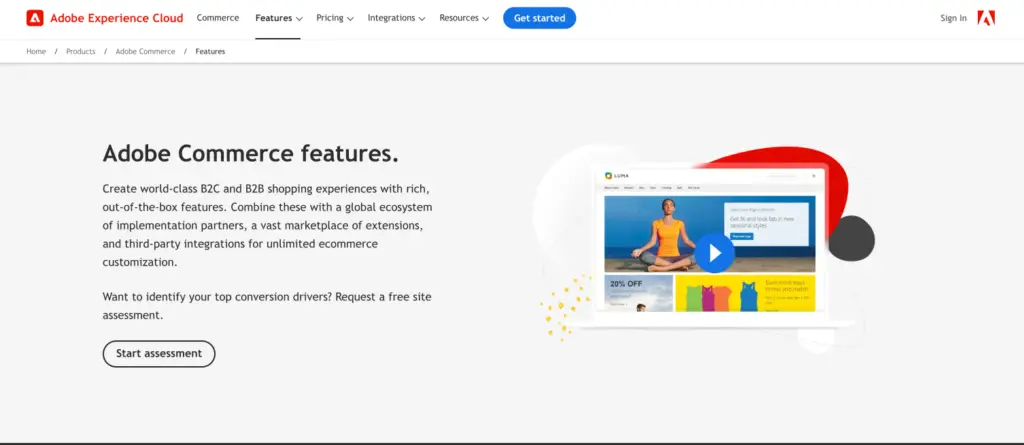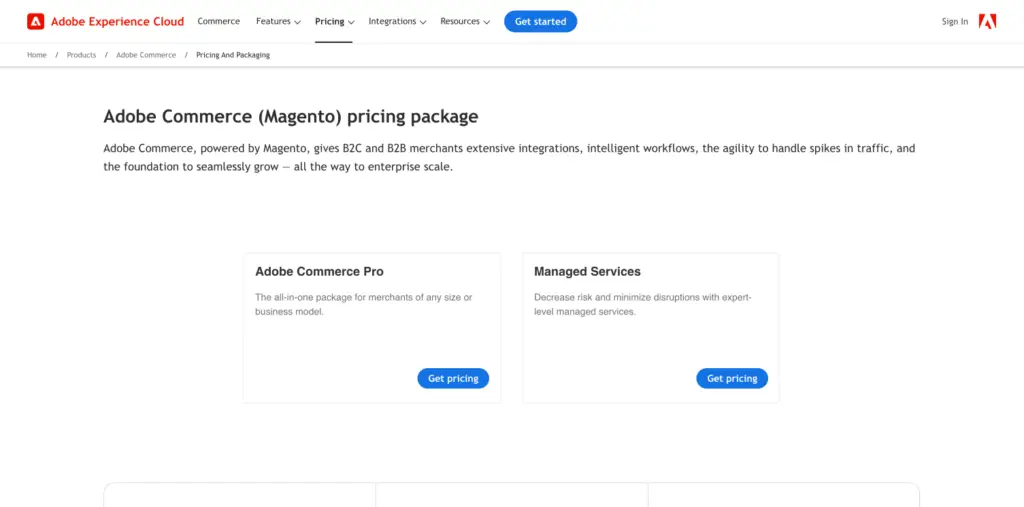Magento, now Adobe Commerce, is a powerful and versatile eCommerce platform designed to provide businesses with the tools they need to create robust online stores. Launched in 2008, Magento has grown to become one of the most popular eCommerce solutions, known for its flexibility, scalability, and extensive customization options. It caters to businesses of all sizes, from small startups to large enterprises, offering both an open-source version and a premium commerce edition.
Selecting the right eCommerce platform is a critical decision for any business looking to establish or enhance its online presence. The platform you choose can significantly impact your business’s success by influencing factors such as user experience, website performance, security, and the ability to scale as your business grows. A well-chosen eCommerce platform ensures seamless operations, supports your business objectives, and provides a solid foundation for future growth. Conversely, a poor choice can lead to operational challenges, increased costs, and missed opportunities.
1. Overview of Magento
Magento was first introduced in 2008 by Varien, Inc., a US private company, with substantial contributions from the open-source community. The platform quickly gained popularity due to its robust set of features and flexibility. In 2011, Magento was acquired by eBay, which further accelerated its development and integration with other technologies. In 2015, Magento was spun off into an independent company, Magento Inc., and continued to evolve its offerings. In 2018, Adobe acquired Magento, integrating it into the Adobe Experience Cloud to enhance its suite of digital commerce solutions.
Key Features and Capabilities
Magento is renowned for its rich feature set, catering to various eCommerce needs. Some of its key features include:
- Customization and Flexibility: Magento allows extensive customization to suit unique business requirements, from themes and layouts to specific functionalities.
- SEO and Marketing Tools: Built-in SEO tools and marketing features help businesses improve their online visibility and attract more customers.
- Mobile Optimization: Responsive design ensures that online stores perform well on all devices, enhancing the user experience for mobile shoppers.
- Product Management: Advanced product management tools enable businesses to handle a large inventory, manage product attributes, and set up complex product configurations.
- Multi-Store Management: Magento supports the management of multiple stores from a single dashboard, allowing businesses to expand their reach and manage various brands or regional stores effectively.
- Integration Capabilities: Magento seamlessly integrates with numerous third-party services and systems, such as ERP, CRM, and payment gateways, facilitating smoother business operations.
- Security: Magento provides robust security features, including regular updates and patches, to ensure a secure shopping environment.
Different Versions (Magento Open Source vs. Magento Commerce)
Magento offers two main versions to cater to different business needs:
- Magento Open Source: Formerly known as Magento Community Edition, this version is free to download and use. It offers a comprehensive set of features for small to medium-sized businesses looking for a flexible and customizable eCommerce platform. Magento Open Source is ideal for businesses with development resources to customize and extend the platform according to their specific needs.
- Magento Commerce: Also known as Magento Enterprise Edition, this is the premium, paid version of Magento. Magento Commerce includes all the features of Magento Open Source, plus additional advanced features and services. These include enhanced performance and scalability, advanced marketing and merchandising tools, dedicated support, and cloud hosting. Magento Commerce is tailored for larger enterprises or businesses with more complex requirements, offering a more robust solution with enterprise-grade functionality and support.
2. Key Features and Benefits

One of Magento’s most compelling advantages is its extensive customization capabilities. Businesses can tailor their online stores to meet specific requirements, ensuring a unique and branded shopping experience. Magento’s modular architecture allows developers to add or modify functionalities using custom modules and extensions. This flexibility means that businesses can create custom themes, integrate bespoke features, and optimize the user interface to enhance customer engagement and satisfaction.
SEO and Marketing Tools
Magento is equipped with a suite of SEO and marketing tools designed to help businesses improve their online visibility and attract more traffic. Key features include:
- SEO-Friendly URLs: Magento allows the creation of clean, descriptive URLs that are optimized for search engines.
- Meta Tags and Descriptions: Users can easily add and manage meta titles, descriptions, and keywords for products, categories, and content pages.
- Sitemap Generation: Magento can automatically generate XML sitemaps, making it easier for search engines to index the site.
- Promotional Tools: Magento supports a variety of marketing campaigns, such as discounts, coupons, and special pricing rules.
- Email Marketing Integration: Magento can integrate with popular email marketing platforms, enabling businesses to send targeted email campaigns based on customer behavior and preferences.
Mobile Optimization
With the growing importance of mobile commerce, Magento ensures that online stores are fully optimized for mobile devices. Key mobile optimization features include:
- Responsive Design: Magento themes are designed to be responsive, ensuring that the store looks and functions well on any device, whether it’s a desktop, tablet, or smartphone.
- Mobile-Friendly Checkout: Magento offers a streamlined, mobile-optimized checkout process, reducing cart abandonment rates and improving conversion rates.
- Progressive Web Apps (PWA): Magento supports PWA, providing a fast, app-like experience on mobile devices, which enhances user engagement and retention.
Product Management
Magento provides robust product management tools that allow businesses to efficiently handle their inventory and product listings. Key features include:
- Catalog Management: Magento supports a wide range of product types, including simple, configurable, bundled, and downloadable products.
- Product Attributes: Businesses can create and manage custom product attributes to better describe and categorize their products.
- Inventory Management: Magento offers advanced inventory management features, including multi-source inventory (MSI), which allows businesses to manage stock across multiple locations.
- Bulk Uploads: Businesses can quickly add and update large numbers of products using CSV import/export functionality.
Integration Capabilities (ERP, CRM, etc.)
Magento’s integration capabilities ensure that businesses can connect their eCommerce platform with other essential systems and tools, streamlining operations and improving efficiency. Key integration features include:
- ERP Integration: Magento can integrate with enterprise resource planning (ERP) systems, enabling seamless data synchronization and improved operational efficiency. This integration helps businesses manage their inventory, orders, and customer data more effectively.
- CRM Integration: Integrating Magento with customer relationship management (CRM) systems allows businesses to better manage customer interactions and data, providing insights that can enhance marketing efforts and customer service.
- Payment Gateways: Magento supports integration with numerous payment gateways, offering customers a variety of secure payment options.
- Shipping and Fulfillment: Magento integrates with shipping carriers and fulfillment services, allowing businesses to automate and streamline their shipping processes.
- Analytics and Reporting: Magento can connect with analytics tools like Google Analytics, providing businesses with valuable insights into their performance and customer behavior.
3. User Experience
Magento offers a comprehensive and intuitive administrative interface designed to simplify store management tasks. Key aspects include:
- Dashboard: A user-friendly dashboard provides a snapshot of important metrics such as sales, orders, and customer data, helping administrators quickly assess store performance.
- Product and Order Management: The platform allows easy management of products, categories, and customer orders. Batch updates, customizable product attributes, and efficient order processing workflows streamline administrative tasks.
- Content Management: Magento’s content management tools enable administrators to create and manage pages, blogs, and promotional content without needing extensive technical knowledge.
- User Roles and Permissions: Administrators can set up different user roles and permissions to control access to various parts of the backend, ensuring secure and efficient team collaboration.
Customer Shopping Experience
Magento focuses on providing an excellent shopping experience for customers through several key features:
- Intuitive Navigation: Magento supports layered navigation and faceted search, allowing customers to easily find products based on various attributes such as price, color, size, and more.
- Personalization: The platform offers personalized shopping experiences by recommending products based on customer behavior and preferences.
- Checkout Process: Magento’s streamlined, one-page checkout process reduces friction, minimizes cart abandonment, and enhances the overall shopping experience.
- Customer Accounts: Customers can create accounts to track orders, save favorite products, and manage their personal information, leading to increased customer loyalty and repeat purchases.
Performance and Scalability
Magento is designed to handle high-traffic volumes and large product catalogs, making it suitable for growing businesses. Key performance and scalability features include:
- Caching: Built-in caching mechanisms, such as Varnish and full-page caching, improve page load times and overall site performance.
- Scalability: Magento’s architecture supports horizontal and vertical scaling, allowing businesses to add more servers or upgrade existing infrastructure to handle increased traffic and transactions.
- Performance Optimization: Magento provides tools and best practices for optimizing database performance, server configurations, and front-end performance.
User Interface and Design Flexibility
Magento offers extensive design flexibility to create a unique and engaging user interface:
- Themes and Templates: A wide variety of themes and templates are available, which can be customized to align with the brand’s identity and aesthetic preferences.
- Drag-and-Drop Page Builder: Magento’s Page Builder allows administrators to create and customize pages using a drag-and-drop interface, making it easy to design and update the site without technical skills.
- Responsive Design: All Magento themes are responsive, ensuring that the online store looks and functions well on any device, providing a seamless experience across desktops, tablets, and smartphones.
4. Pricing and Costs

Magento Open Source is a free version of the platform, but there are still associated costs to consider:
- Hosting: Costs vary based on the hosting provider and the resources required, ranging from shared hosting for small stores to dedicated servers for larger operations.
- Development and Customization: Depending on the complexity of the store and required customizations, businesses may need to invest in development services. This can range from a few thousand dollars for basic setups to tens of thousands for more advanced customizations.
- Extensions and Themes: Additional functionality and design customization often require purchasing extensions and premium themes from the Magento Marketplace.
Pricing Tiers for Magento Commerce
Magento Commerce offers several pricing tiers based on the size and needs of the business:
- Magento Commerce Starter: Aimed at small to mid-sized businesses, this plan includes cloud hosting and essential features, starting at around $2,000 per month.
- Magento Commerce Pro: Designed for larger enterprises, this plan offers advanced features, higher performance, and dedicated support, with pricing starting at around $3,417 per month.
- Custom Plans: For businesses with specific needs, Magento offers custom pricing plans based on the business’s unique requirements and transaction volumes.
Additional Costs (Hosting, Extensions, Maintenance)
Regardless of the version, there are additional costs to consider:
- Hosting: For Magento Open Source, hosting costs depend on the provider and the required resources. For Magento Commerce, hosting is included in the subscription.
- Extensions and Themes: Both versions may require purchasing extensions and premium themes for additional functionality and customization, with prices ranging from $50 to several thousand dollars.
- Maintenance and Support: Ongoing maintenance, security updates, and support services are essential to keep the store running smoothly. This can be handled in-house or outsourced, with costs varying based on the level of support needed.
- Licensing Fees: Magento Commerce includes licensing fees as part of the subscription, while Magento Open Source has no licensing fees but may incur other costs for compliance and third-party integrations.
5. Security
Magento places a strong emphasis on security, offering numerous built-in features to protect online stores:
- Two-Factor Authentication (2FA): Adds an extra layer of security by requiring a second form of verification in addition to the password.
- Role-Based Access Control (RBAC): Administrators can define specific roles and permissions, limiting access to sensitive areas of the backend.
- Data Encryption: Secure data transmission through HTTPS and SSL certificates to protect sensitive customer information.
- Custom Admin Path: Allows changing the default admin URL, reducing the risk of brute-force attacks.
- Captcha: Helps prevent automated login attempts and spam by requiring users to complete a CAPTCHA test.
Compliance with Data Protection Regulations
Magento supports compliance with various data protection regulations to ensure the privacy and security of customer data:
- GDPR Compliance: Tools and features to help businesses comply with the General Data Protection Regulation (GDPR), including data anonymization and customer data access.
- PCI Compliance: Ensures that Magento stores meet the Payment Card Industry Data Security Standard (PCI DSS) requirements for secure credit card transactions.
Regular Updates and Patches
Magento regularly releases updates and security patches to address vulnerabilities and enhance security:
- Security Patches: Frequent patches are provided to fix security vulnerabilities and improve overall platform security.
- Automatic Updates: For Magento Commerce Cloud, automatic updates ensure the platform is always up-to-date with the latest security enhancements.
Community Support for Security Issues
The Magento community plays a vital role in maintaining the platform’s security:
- Magento Security Center: An official resource providing security updates, best practices, and alerts about potential vulnerabilities.
- Community Contributions: Active community members and developers frequently identify and report security issues, contributing to the platform’s robustness.
- Forums and Discussions: Community forums and discussion boards offer advice and solutions for addressing security concerns and implementing best practices.
6. Customer Support and Community
Magento offers various support options to help businesses maintain and optimize their stores:
- Magento Commerce Support: Dedicated support for Magento Commerce customers, including 24/7 technical assistance and access to a Customer Success Manager.
- Help Center: An extensive online help center with articles, guides, and documentation covering various aspects of the platform.
- Training and Certification: Magento offers training programs and certification courses for developers, administrators, and solution specialists.
Community Forums and Resources
The Magento community is a valuable resource for users seeking assistance and information:
- Magento Forums: An active forum where users can ask questions, share experiences, and find solutions to common problems.
- Magento Stack Exchange: A dedicated Q&A site for Magento developers and users to discuss technical issues and share expertise.
- Blogs and Tutorials: Numerous community-contributed blogs and tutorials provide tips, best practices, and detailed guides on various topics.
Availability of Third-Party Developers and Agencies
A vast ecosystem of third-party developers and agencies supports Magento:
- Certified Developers: Magento’s certification program ensures that developers possess the necessary skills and knowledge to work with the platform.
- Solution Partners: Magento Solution Partners are certified agencies that offer a range of services, including implementation, customization, and ongoing support.
- Marketplace: Magento’s official marketplace offers thousands of extensions and themes developed by third-party providers to enhance store functionality and design.
7. Pros and Cons
- Flexibility and Customization: Highly customizable platform that can be tailored to meet specific business needs.
- Scalability: Capable of handling large product catalogs and high traffic volumes, making it suitable for growing businesses.
- Robust Feature Set: Comprehensive features for product management, marketing, SEO, and more.
- Strong Community Support: Active community and extensive resources available for troubleshooting and improvements.
- Advanced Security: Multiple built-in security features and regular updates to protect against threats.
Common Challenges and Drawbacks
- Complexity: Steep learning curve and may require technical expertise to fully utilize and manage the platform.
- Cost: High costs associated with Magento Commerce, including licensing fees, hosting, development, and maintenance.
- Performance: Requires proper optimization and hosting solutions to ensure optimal performance, especially for large stores.
- Maintenance: Regular maintenance and updates are necessary to keep the platform secure and running smoothly.
Comparison with Other eCommerce Platforms (Shopify, WooCommerce, etc.)
- Shopify: Easier to use with a user-friendly interface and simpler setup process. However, it offers less flexibility and customization compared to Magento.
- WooCommerce: Highly customizable and built on WordPress, making it suitable for content-driven sites. However, it may not scale as effectively as Magento for large enterprises.
- BigCommerce: Offers robust features and ease of use, similar to Shopify, but with more built-in functionalities. It still lacks the level of customization and scalability that Magento provides.
Magento stands out for its extensive customization options, scalability, and powerful features, making it an excellent choice for businesses looking to build a highly tailored and robust online store. However, it requires a significant investment in terms of time, money, and technical resources to leverage its capabilities fully.

